California Welcomes 200,000 New Immigrant Drivers into System that Annually Suspends Half a Million Licenses

California, which has around 24.5 million legal drivers, just licensed 200,000 undocumented immigrants this year and expects 1.5 million to apply under a new state law. Many of them won’t have their licenses for long.
State and local governments have put a lot of time and effort over the years into turning traffic courts into a replacement source of funding lost to economic downturn, lower taxes on upper-income folks and suspect spending priorities.
The result in California, according to a new study (pdf) from five civil rights groups, is increased income inequality as the extraordinary burden of cascading fines and fees leads to millions of driver’s license suspensions for poorer people. From 2006-2013, California suspended 4.3 million licenses, averaging more than 500,000 a year for eight years. Only 71,000 of the licenses were restored.
The report says:
“Steep fine increases, expanded use of license suspensions as a means of collecting these fines, and reduced access to relief through the courts combine to make the traffic court system an intractable problem for people with limited income.”
The study, “Not Just a Ferguson Problem: How Traffic Courts Drive Inequality in California,” is getting a lot of media attention this week, but it is not a new story.
In 2006, the California Research Bureau calculated that traffic violations generated $502.6 million in revenue, and that was before the Great Recession. In 2013, the Center for Investigative Reporting (CIR) broke down a fine received by one Derick Neal, who was dinged for a rolling stop in San Leandra during a right turn at a traffic light, and counted 11 separate charges in addition to the base fine of $100.
That brought the bottom line to $549, but you can tack on another $300 if a court date is missed. That’s a lot easier to do these days in a cash-strapped judicial system that is making access to the courts a lot harder for people.
Some people have long questioned whether sticking the bill on traffic tickets is a fair way of spreading the cost of government. Fees are inherently more regressive than taxes and harder on people with lower incomes, who end up spending a larger percentage of their income on them. But fees are much easier for lawmakers to assess than taxes, which still evoke a firestorm of protest 37 years after Prop. 13 fever swept the state. A lot of people feel that shifting the tax load away from the wealthy is a feature, not a flaw, in the system.
Wealthier people can pay the fine, but losing one’s driver’s license can be the difference between being among the working poor and shunted into homeless poverty. An added bonus is carrying around the debt while trying to crawl back to solvency.
The new report cited a report last year from the independent Legislative Analyst’s Office (LAO) that court-ordered unpaid debt now tops $10.2 billion. The report spent a lot of time proposing schemes for how the counties could collect the debt for the courts, 40% of which flows to them: Grabbing folks before they left the courthouse to set up a payment plan; better communication with debtors; and creation of more efficient tools for restructuring debt.
The LAO did not consider that the problem was with the debt, not the debtor. But some lawmakers do.
State Senator Bob Hertzberg (D-Los Angeles) introduced legislation this week which offers limited amnesty to offenders. Senate Bill 405 would let low-income drivers who ran afoul of the law before 2013 get their licenses back by paying a portion of their original fine. No criminal action would be taken against participants.
The law would take effect in 2016 and be operative for two years.
–Ken Broder
To Learn More:
Disparity Is Seen in California Driver’s License Suspensions (by Timothy William, New York Times)
California’s License Scheme Punishes the Poor (by Peter Funt, GazetteXtra)
State Senator Pushes Bill to Reduce Driver's License Suspensions (by Lee Romney, Los Angeles Times)
Driver's License Suspensions Push Poor Deeper into Poverty, Report Says (by Lee Romney, Los Angeles Times)
How Driving While Poor Became a Crime in California (by Carimah Townes, ThinkProgress)
Why a $100 California Traffic Fine Ends up Costing $549 (by Ken Broder, AllGov California)
Californians Owe $10.2 Billion in Court-Ordered Debt and It’s Growing (by Ken Broder, AllGov California)
Not Just a Ferguson Problem: How Traffic Courts Drive Inequality in California (pdf)
- Top Stories
- Controversies
- Where is the Money Going?
- California and the Nation
- Appointments and Resignations
- Unusual News
- Latest News
- California Forbids U.S. Immigration Agents from Pretending to be Police
- California Lawmakers Urged to Strip “Self-Dealing” Tax Board of Its Duties
- Big Oil’s Grip on California
- Santa Cruz Police See Homeland Security Betrayal in Use of Gang Roundup as Cover for Immigration Raid
- Oil Companies Face Deadline to Stop Polluting California Groundwater





